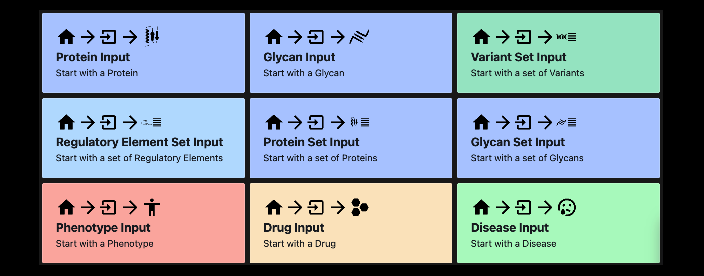
The Ma’ayan Lab developed several platforms that streamline large-scale data analysis in Bioinformatics with reproducible and scalable workflows. These platforms make it easy for researchers without computational backgrounds to apply advanced and flexible computational methods to their own omics datasets.
Browse through the following categories to explore the various original resources we have developed:
Most Popular | Recently Published | Enrichment Analysis | Drug and Target Discovery | Computational Platforms and Workflow Engines | Gene and Drug Pages | lncRNAs | Data Portals | Data Visualization Components | Deprecated
Appyters
Collection of Web-based Applications to Execute Bioinformatics Workflows
Appyters extend Jupyter notebooks to broaden their accessibility by turning Jupyter notebooks into fully functional standalone web-based bioinformatics applications. Each Appyter presents to users an entry form enabling them to upload their data and set various parameters for executing a multitude of bioinformatics analysis pipelines. Once the form is filled, the Appyter executes the corresponding notebook in the cloud, producing a report without requiring the user to interact directly with the code. Appyters can be applied to a variety of workflows including building customized machine learning pipelines, analyzing omics data, and producing publishable figures.
PMID: 33748796
Playbook Workflow Builder
Interactive Construction of Bioinformatics Workflows
The Playbook Workflow Builder (PWB) is a web-based platform to dynamically construct and execute bioinformatics workflows by utilizing a growing network of input datasets, semantically annotated API endpoints, and data visualization tools contributed by an ecosystem of collaborators. Via a user-friendly user interface, workflows can be constructed from contributed building-blocks without technical expertise. The output of each step of the workflow is added into reports containing textual descriptions, figures, tables, and references. To construct workflows, users can click on cards that represent each step in a workflow, or construct workflows via a chat interface that is assisted by a large language model (LLM). Completed workflows are compatible with Common Workflow Language (CWL) and can be published as research publications, slideshows, and posters.
PMID: 40179105
BioJupies
Automated Generation of Interactive Notebooks for RNA-seq Data Analysis in the Cloud
BioJupies is a web server that enables automated creation, storage, and deployment of Jupyter Notebooks containing RNA-seq data analyses. Through an intuitive interface, novice users can rapidly generate tailored reports to analyze and visualize their own raw sequencing files, their gene expression tables, or fetch data from >9,000 published studies containing >300,000 preprocessed RNA-seq samples.
PMID: 30447998
FAIRshake
Toolkit to Evaluate the FAIRness of Research Digital Resources
As more digital resources are produced by the research community, it is becoming increasingly important to harmonize and organize them for synergistic utilization. The findable, accessible, interoperable, and reusable (FAIR) guiding principles have prompted many stakeholders to consider strategies for tackling this challenge. The FAIRshake toolkit was developed to enable the establishment of community-driven FAIR metrics and rubrics paired with manual and automated FAIR assessments. FAIR assessments are visualized as an insignia that can be embedded within digital-resources-hosting websites. Using FAIRshake, a variety of biomedical digital resources were manually and automatically evaluated for their level of FAIRness.
PMID: 31677972
GEN3VA
Gene Expression and Enrichment Vector Analyzer
A web-based system that enables the integrative analysis of aggregated collections of tagged gene expression signatures identified and extracted from GEO. Each tagged collection of signatures is presented in a report that consists of heatmaps of the differentially expressed genes; principal component analysis of all signatures; enrichment analysis with several gene set libraries across all signatures, which we term enrichment vector analysis; and global mapping of small molecules that are predicted to reverse or mimic each signature in the aggregate.
PMID: 27846806
GEO2Enrichr
Browser Extension for Extracting Differentially Expressed Gene Sets from GEO
A web application and two browser extensions (one for Chrome and another for Firefox) designed to facilitate the extraction of signatures from studies posted on the Gene Expression Omnibus (GEO) database. These signatures are then submitted to Enrichr for downstream functional analysis.
PMID: 25971742





